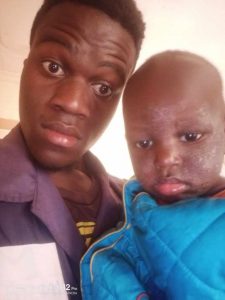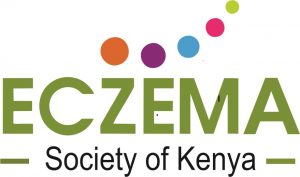
February 26, 2025, by mszteh
The burden of eczema patients in Kenya
The following blog has been written by Rachel Ogola, President of the Eczema Society of Kenya and EUPATI Fellow. We are fortunate that Rachel sits on one of our Rapid Eczema Trials co-production groups. It’s invaluable to have someone like Rachel helping to develop messaging around our research that can resonate with the global eczema community. We also hope that low and middle income countries will be able to use the online citizen science methods we develop for running clinical trials to answer patient-driven health questions.
The burden of eczema patients in Kenya
Eczema affects many patients across Kenya, yet it remains largely ignored and unprioritized. Patients face immense struggles, from wrong diagnosis, access to specialists, and long waits in queues. Patients in rural areas endure long journeys and walks to access hospitals and specialists. By the time a patient is diagnosed with eczema by an expert, they have probably been to four or more medics and been subjected to many tests and trial medication, including mishandling. Some patients give up along the way, others don’t get to ever see a specialist because they are already drained  financially or emotionally.
financially or emotionally.
The Eczema Society of Kenya works tirelessly to support patients, but limited resources, lack of enough personnel, stigma, cultural beliefs and inadequate funding make this work extremely difficult.
Key challenges for eczema patients in Kenya
Too few dermatologists
There are only about 30 registered Dermatologists in Kenya against a population of 55 million. Most dermatologists are based in urban centres, leaving patients in rural areas with very few options. Many patients endure long days and nights of travelling or walking only to wait days or weeks for an appointment.
High cost of treatment
Most of the creams and emollients used for the treatment of eczema are imported, making them very expensive to buy locally. It is also expensive to see a skin specialist. Many Kenyans live below the average income wage. Insurance Companies barely pay for creams after prescription. Many families struggle to put food on the table; the cost of treatment and medication would be the last thing on their minds, leading to flare‐ups, infections and poor quality of life.
Lack of awareness, cultural beliefs and stigma
There’s still little information on eczema. Cultural beliefs on skin diseases hang tight on the necks of patients. Eczema is believed to be a curse, bad omen and punishment. This has led to children being hidden in their homes or complete inability to attend school because of the extreme nature of condition, leading to lack of schooling, or drop-outs. Families have been disintegrated because of eczema, mostly by men remarrying and abandoning their families. Because of shame, families would rather opt for alternative healing which can be messy and harmful.
Lack of research and data
There’s very little to no research at all. Emphasis is on tropical diseases. This has made it difficult to understand prevalence, priority areas, and best treatment approaches. It has also affected advocacy, partnerships, call to action and policy influence.
Struggles of patient organisations
Organizations face ongoing funding challenges, lack of resources and inadequate capacity, thereby limiting their ability to support patients. The high demand for access to treatment far exceeds available resources.
The Eczema Society of Kenya wishlist
- Expanding access specialists
- Advocate for local production of creams and emollients
- Lobby the Government and stakeholders for removal of taxes and duty on creams and emollients
- Work with Health Insurance and Government agencies:
- Push for policies that protect patients from discrimination in schools and workplaces
- Lobby for a National nutrition package for patients living with skin diseases
- Strengthen advocacy and awareness campaigns
- Awareness and education in communities and schools to reduce stigma and misinformation
- Increased research efforts
- Study eczema prevalence and treatment effectiveness in Kenya
- Secure research grants and funding for local studies
- Strengthening patient organizations
- Recruit local and international volunteers and set up mobile clinics in remote areas of Kenya
- Secure funding for more robust advocacy, capacity building and legal aid fund for affected patients.
If you would like to find out more about Rapid Eczema Trials, please visit our website or email us on eczema@nottingham.ac.uk
The Rapid Eczema Trials project involves researchers, healthcare professionals and citizen scientists (people with eczema and parents of children with eczema) working together to answer important questions about eczema by designing and running clinical trials together.
The Rapid Eczema Trials programme is sponsored by Nottingham University Hospitals NHS Trust and is funded by the National Institute for Health and Care Research (NIHR) under its Programme Grants for Applied Research programme (PGfAR NIHR203279). The views expressed are those of the author(s) and not necessarily those of the NIHR or the Department of Health and Social Care.
No comments yet, fill out a comment to be the first



Leave a Reply